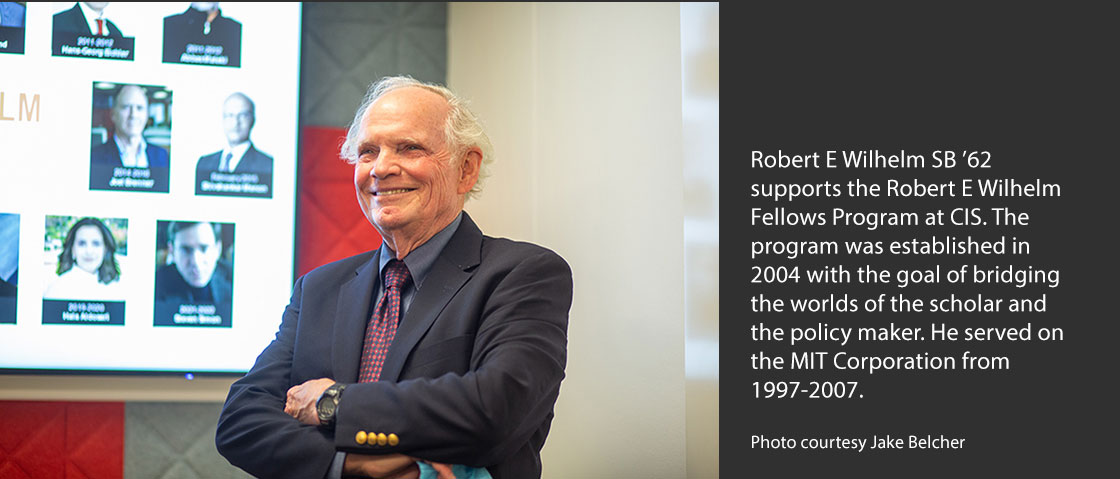The Robert E Wilhelm Fellows Program brings real-world experience and new scholarship to CIS and is a vital part of its research community. CIS recently welcomed Robert Wilhelm '62 and his wife, Gena Whitten, to campus to express gratitude for funding the fellowship and to inaugurate a new conference room named in his honor.
The Center for International Studies (CIS) has long been valued as one of the world’s premier, university-based global research and education centers. A hallmark of the center’s many programs is the opportunity for academics and practitioners to work together on policy-relevant problems.
The Robert E Wilhelm Fellows Program is among the center’s most prestigious fellowships and is reserved for individuals who have held senior positions in public life. It has brought to campus heads of international non-governmental organizations, national security advisors, US military leaders, senior diplomats, and retired cabinet ministers including one former prime minister.
Since its inception in 2004, the Center has hosted 18 Wilhelm Fellows from around the globe, including Egypt, India, Israel, Japan, Mexico, Saudi Arabia, Sri Lanka, Sudan, United Kingdom, and the United States.
A generous gift from Robert E Wilhelm ’62 supports this annual fellowship.
CIS recently welcomed Wilhelm and his wife, Gena Whitten, to campus to express gratitude and to inaugurate a new conference room named in his honor. His visit on May 26 coincided with his 60th class reunion at MIT.
Richard Samuels, the Ford International Professor of Political Science and director of CIS, commenced the event by thanking Wilhelm for conceptualizing and funding the fellowship at CIS.
For us, the Wilhelm fellows have been a daily reminder of the value of MIT’s commitment to its core mission of 'mens et manus',” said Samuels.
“Bob’s idea for—and generous support of—bringing seasoned professionals on the international stage to engage with the faculty and graduate students at CIS was inspired. Each of us at the Center—and in the MIT community generally—benefits from this engagement, however formal or casual. It informs our understanding of how the world works, refreshes our sense of service, and helps guide our hopes to make the world a better place. For us, the Wilhelm Fellows have been a daily reminder of the value of MIT’s commitment to its core mission of 'mens et manus',” said Samuels.
Lourdes Melgar SM '88, PhD '92, and a Wilhelm Fellow in 2016, was among the many attending guests.
“I have the privilege to be part of the Robert E Wilhelm Fellow tribe. I had to be here today to thank Bob for his foresight, generosity and for bestowing me the gift of time and space to re-imagine my life,” said Melgar, who was Mexico’s deputy secretary of energy for hydrocarbons and undersecretary for electricity leading up to the fellowship.
Melgar also was a member of Mexico's foreign service from 1997 to 2005.
It must be a dialogue: knowledge without a reality check can become empty words.
“As a Wilhelm Fellow, I came to realize the importance of the continuous dialogue between academia and policymakers. It must be a dialogue: knowledge without a reality check can become empty words. I see it when proposed technical solutions to accelerate the energy transition do not consider the social and political challenges of energy systems transformation. So, I thank you for giving me the chance of spending a whole year at MIT, learning and testing ideas,” concluded Melgar.
Additional remarks were shared by Steven Simon, the current Wilhelm Fellow at CIS. Simon served as the National Security Council (NSC) senior director for the Middle East and North Africa during the Obama Administration and as the NSC senior director for counterterrorism in the Clinton White House. These assignments followed a 15-year career at the US Department of State.
“The opportunity provided by Robert Wilhelm to think deeply, or at least as deeply as I am able, about questions raised by our government service but imponderable while we were in it, is such a blessing. In my case, it’s enabled me to finish a book about a phase in the history of the U.S. and Middle East that began when I entered government and seemed to fade out as I left it. While the outcome was something less than inspirational, my thinking about U.S. policy was transformed through the writing of the book.”
A celebratory toast to Wilhelm was provided by Agustín Rayo, the Kenan Sahin Dean of the MIT School of Humanities, Arts, and Social Sciences and professor of philosophy at MIT.
“Excellent work is being done at CIS. But in order to achieve this level of excellence we need partners—people like Bob and Gena,” concluded Rayo.




